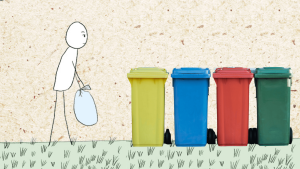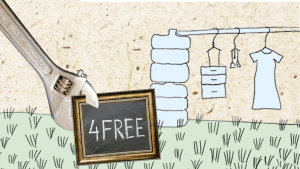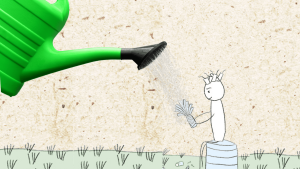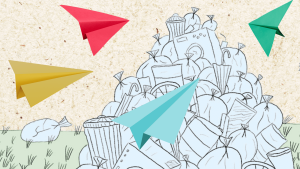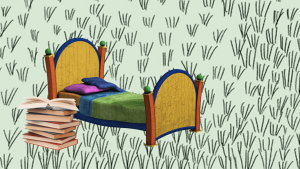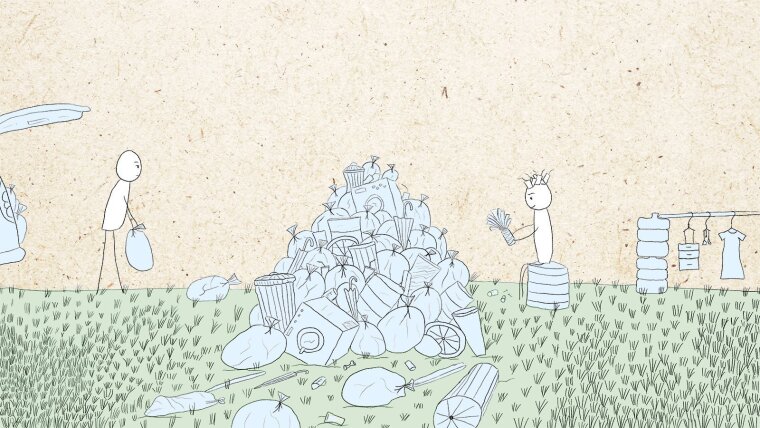
We are sourrounded by products that make our lives simpler and at the same time more complex. Whether it's a toothbrush, a smoothie jar, a laptop, or a phone - every item has a limited lifespan and raises questions about procurement and disposal.
To understand the impact of your individual lifestyle on the environment, you can calculate your ecological footprintExternal link with a simple tool. This will give you an idea of the environmental effects of your lifestyle.
Decisions in politics and the economy are needed for fast and large-scale changes. Nevertheless, many small steps can also make a difference.
This is how you can save resources every day:
-
Avoiding and seperating waste
A person carries a rubbish bag to colourful rubbish bins.
Collage: Julian Ukena, Tabea Seeßelberg, Pawel CzerwinskiCould you do with a little less?
We live in a society that produces vast amounts of waste. In Germany, this amounts to almost 500 kilograms per capita per year. Much of it cannot be recycled and results in unusable waste. Recycling processes are likewise energy-intensive and involve additional consumption of resources. By no means everything that ends up in the yellow bin is actually recycled: the recycling rate in Germany was below 50% in 2019. Not even 10% of raw material use can currently be avoided through recycling. Thus in addition to proper separation, waste avoidance is an important part of dealing sustainably with our planet.
Helpful information concerning garbage
- The university's Waste ABC de (available in German only) helps you to sort all types of trash occurring in daily university life.
- You can find more tips on proper waste separation at muelltrennung-wirkt.deExternal link.
- You can get the most important facts on waste separation at a glance with this posterExternal link (available in German only) from the German Environment agency.
This way you can improve your waste management:
- Buy products without packaging if possible. If you can't avoid it, make sure the packaging is as light and recyclable as possible. Caution: Disposable glass often has a worse eco-balance than plastic, especially if the transport route is long.
- Separate your trash. In university facilities, different containers are often located in hallways or foyers. Avoid disposing of residual waste in the yellow container – this seriously interferes with the recycling process.
- Bring used glass to the appropriate container and make sure it is separated by color. The lid should be disposed of in the yellow garbage can.
- Separate wrappings into their individual components, such as removing the lid of a yogurt container from the rest of the cup – this will help the waste to be recycled.
- Dispose of cables and batteries at collection sites for electronic waste only. Further information on the disposal of electrical appliances is available at Kommunalservice JenaExternal link (in German only).
- Avoid packaging made from composite materials (e.g. the paper bag with plastic window), as these are difficult to separate.
- Do not dispose of bags made of so-called bioplastics in organic waste! Biodegradable plastics take a long time to decompose and cannot be recycled in composting plants.
-
Re-use and Recycle
In front of a clothes rack is a sign saying "For Free" held by a screwdriver.
Collage: Julian Ukena, Robert Ruggiero, Tabea Seeßelberg, via canva.com: KenruenRepair, share, give away
Help to avoid piles of garbage! In Jena, you can take advantage of a range of opportunities to extend the lifespan of your belongings.
Often these opportunities to share, give away and repair offer ways to get in touch with like-minded people.
- Repairing instead of discarding: At the repair caféExternal link (available in German only) in Jena you will find support.
- If your computer has a bug you can look for a fix together with volunteers of the weekly computer self-help workshop in the MagdelstubeExternal link (available in German only).
- Sharing is Caring – that's the name of a Telegram groupExternal link in Jena. Here you can find new users for your discarded treasures and arrange for pick-ups.
- Change your clothes without a dime: The UmweltreferatExternal link (available in German only) organizes a clothing exchange several times a year, where you can drop your old clothes and find new treasures – all for free.
- A visit to the Free Shelf is worthwhile if you want to pass on still usable, small items. In the dining halls of the Studierendenwerk you will find gift shelves and in Frei(t)raum on the first floor of Carl-Zeiß-Straße 3 there is another possibility to give away your belongings in an uncomplicated way. You can find more free shelves in Jena on this mapExternal link (available in German only).
Reusables in university life
A fabric bag, a jar and a lunch box together are a valuable trio of sustainability – with them by your side, you'll avoid wrapping and extra costs every day.
- The fabric bag: Probably the most reliable option for a quick stop at the supermarket.
- The lunch box: Whether snacks from the cafeteria, leftovers from lunch or breakfast to go – the lunch box not only serves to carry all kinds of food, but also gives you the opportunity to eat whenever you want. In the dining halls, you can also use your lunchbox as a container for take away meals.
- The jar: As a leak-proof container, the jar is suitable for transporting drinks and snacks. It allows you to enjoy your cup of coffee wherever you like without producing waste. In unpacked stores you can fill your purchases from cornflakes to kidney beans into the jar and thus avoid further wrappings. When transporting hot drinks, you can wrap the glass in a single sock to keep it warm and avoid burning your fingers.
- The Studierendenwerk Thüringen offers reusable containers for purchase or loan in dining halls. You can learn more about Relevo reusable containers on this websiteExternal link.
Do it Yourself
You can avoid packaging waste and harmful ingredients by producing everyday products yourself. The students' initiative Umweltreferat offers useful DIY and upcycling tutorialsExternal link (available in German only) from deodorant to household detergent.
-
Water consumption
A large watering can sprinkles a pineapple held by a small person.
Collage: Julian Ukena, Tabea Seeßelberg, via canva.com: Billion PhotosPerhaps the simplest trick: When thirsty, satisfy yourself with water from the tap. Many research studies confirm that tap water in Germany is perfectly safe. In some places the purity is even better than that of bottled water. One of the reasons for this is the fact that tap water has to pass quality tests much more often.
By drinking tap water, you help to avoid emissions that occur during transportation, save chemicals used to clean bottles, and reduce the use of raw materials used to produce disposable bottles. At Refill JenaExternal link you can find a map with places where you can refill your bottle with fresh water for free.
You can report leaking faucets at the university to the responsible janitorial service de (available in German only)!
You can find information and tips on saving water in private households at Friends of the Earth UKExternal link and the German Environment AgencyExternal link (available in German only). You can make a difference every day, especially when showering and doing laundryExternal link!
-
Paper consumption
Colourful paper planes circle around a pile of rubbish.
Collage: Julian Ukena, Tabea Seeßelberg, via canva.com: Pengedar Sedi, Billion Photos, Guiseppe Ramos D.Do you really have to print it?
Presentation, handout, transcripts, flyers, magazines, and other documents are often available both digital and in print. Depending on how you organize yourself, you may have to print dozens of sheets a day – or none at all.
This is how you can avoid paper waste:
- Print on both sides / use duplex function.
- Check the printer settings: If the font size allows it, choose the option "2 pages per sheet".
- Use single-sided paper, e.g. as a notepad.
- Before you start printing, check that all settings are selected correctly and consider printing a test page before you have to print dozens of pages twice.
- Keep an eye out when buying paper: The ecolabel Blue AngelExternal link and the FSC sealExternal link indicate a high percentage of recycled material.
- You can save toner by printing in grayscale and installing a font that uses less color. You can find advice on how to use these fonts at ecofont.com.External link
- Placing a "no advertising" sign on your mailbox saves paper and makes it more convenient for you to check your mail.
-
Furnishing your home
On a green lawn there is a cosy bed with a pile of books
Collage: Julian Ukena, Tabea Seeßelberg, via canva.com: phodopus, susannp4Sustainability in your appartment
You are about to start your degree in a new city and are facing the challenge to get setled in your flat share or dorm room. More than a thousand students in Jena experience this situation every year. A visit to the furniture discounter seems inevitable to keep costs affordable. However, the downsides of cheap furniture are its resource-intensive production and its short lifespan.
"Fast Furniture" is proving to be a destructive trend globally: the quality of the products is often poor. Quickly the new shelf ends up in the dumpster. The good news: There are ways to furnish your room in a more environmentally friendly and cost-effective way. Often you can even find more individual pieces for your own four walls:
- Look out for give-away boxes on the side of the road – sometimes you can find useful items for your appartment.
- Visit the free shopExternal link (available in German only) – here you can get everything without money.
- Giveaway shelves and sharing groups can be of great help. Via Ebay KleinanzeigenExternal link (available in German only) you might be lucky to find used items for free or at low cost.
Please note: The websites and groups mentioned are an exemplary compilation. The Friedrich Schiller University Jena does not advertise for named or against not named institutions.
Ease the shopping madness
The world is full of advertising that wants to persuade us to buy yet another thing that we allegedly need for our happiness. But did we really miss anything without the new sandwich maker or the third pair of sparkly sunglasses?
Before you start your next shopping trip, think about which purchases are really necessary and what products will serve their purpose for a long time.
Before purchasing, ask yourself:
- Has the product been produced fairly?
- How harmful is the product for the environment?
- Do I need to buy this item new or do I already have something that I could easily fix, repurpose, etc.?
- Do I really have to possess the product myself, or can I share it with flatmates, friends or neighbours?
- Does the item have multiple functions or will I need to buy something similar again later?
- Does it make sense to spend more money on a durable product instead of having to replace it soon?
- Can I buy it used?
You can create a list counting how often you miss an item to decide if you really do need a new purchase. Only when you realize that you would really use it often (e.g. 15 times) should you consider buying it. This way you avoid impulsive buying.
